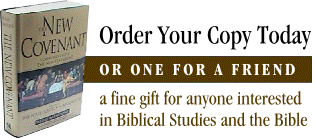|
from the Darkness at noon 33At when it was the sixth hour, at noon,
the whole earth became dark until three in the afternoon. 34At
three o'clock, Yeshua called out words from the Psalms in a loud voice, His women look on 40There were also women looking on from a distance, among whom were both Miryam of Magdala166 and Miryam mother of Yaakov the younger and of Joses,167 and Shlomit,168 41who were in the Galil following him and serving him, and there were many other women who had gone up with him to Yerushalayim. The body in linen entombed in rock 42Evening had already come, and since it was
Friday (day of Preparations), the Day-Before-Shabbat,169
43Yosef of Arimathaia,170
a prominent member of the council, who was also looking for the kingdom
of God, boldly went to Pilatus and asked for the body of Yeshua.
CHAPTER 16 The women in the empty tomb |
162Ps. 22.1. Yeshua's words are in Aramaic. 163The bystanders mistakenly heard "Eliyah" for "Eloi," "my God." 164From the Greek, meaning "vinegar" or "sour wine." 165A centurion was a commander of 100 Roman soldiers. In the story of the crucifixion, after Yeshua has been mocked by Jewish bystanders, the high priests and those crucified with him, and the curtain in the Temple has sympathetically torn in two, foretelling the Temple's imminent doom, the first to recognize that Yeshua was the son of God is the commander of the execution squad. This exoneration of Roman leadership, who now are not only guiltless in Yeshua's execution but the first in Jerusalem to state his divinity, follows the pattern of preparing the move of the authority of Yeshua's messiahship to Rome. 166Mary Magdalene from the city of Magdala. 167It is not known who Miryam mother of Yaakov the younger and of Joses is. She may be Yeshua's mother, though there is not a consensus in favor of this view. Since she is called the mother of Yaakov rather than Yeshua, it is unlikely that Mark intended to identify her as Miryam mother of Yeshua. Elsewhere Yeshua's brothers are identified as James, Joses (Joseph), Judas, and Simon, that is, Yaakov, Yosef, Yehuda, and Shimon. In Mark, Yeshua's mother is not portrayed sympathetically, but by Luke, the last synoptic gospel, Miryam is glorified. The virgin birth is stated in the birth stories of Mathew and Luke, and the nativity in Luke fixes her later image. 168Salome from the Greek, from the Hebrew (shlomit or shelomit). Salome may be the wife of Zebedee and so the mother of James and John. 169The Greek word for "preparation," (paraskevi), has come to mean "Friday" in the Greek. Here, it means both Friday and preparation for the Pesach. Another word for Friday is Prosabbaton, meaning "the day before Shabbat (the Sabbath)." 170Yosef of Arimathea was presumably a member of the Sanhedrin, the council that, according to the gospels, asked for Yeshua's death. This apparent contradiction of role may be softened by the description of his piety and vision of the kingdom of God. Arimathea is from the Greek (Arimathaia,) and is identified with either Ramathaim or Rentis, fifteen or twenty miles east of Jaffa. 171Matthew identifies the young man as an angel (28.2). 172The earliest manuscripts end with the dramatic
fear of the women in ekstasis, her rendered "ecstasy,"
which conveys the literal meaning of "being outside themselves"
as well as "ecstasy" with its multiple meanings of "amazement"
in "being elsewhere" and "beside themselves" with
fear. |
||
More about poet/translator Willis Barnstone including other translations,
|
|||
